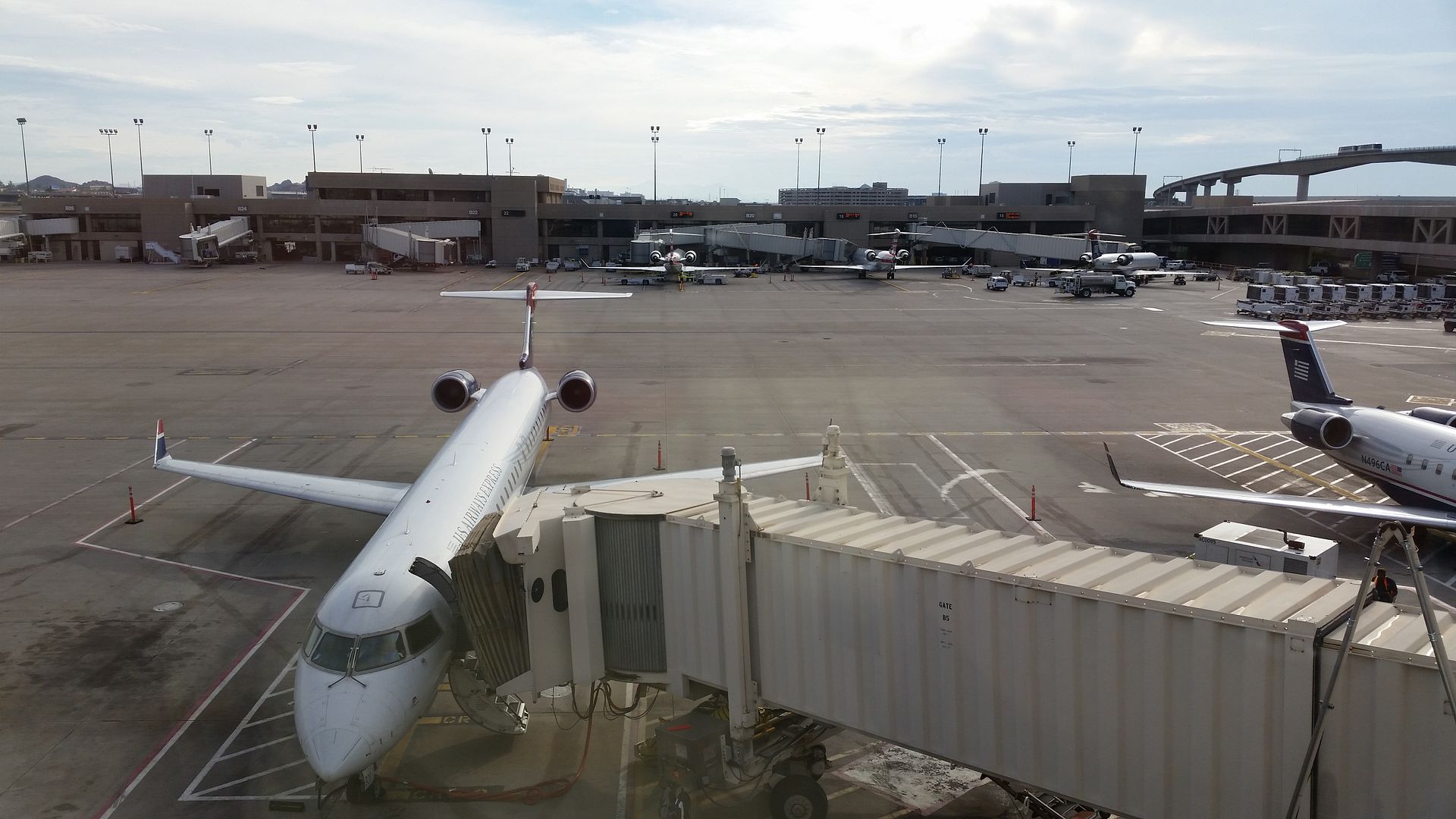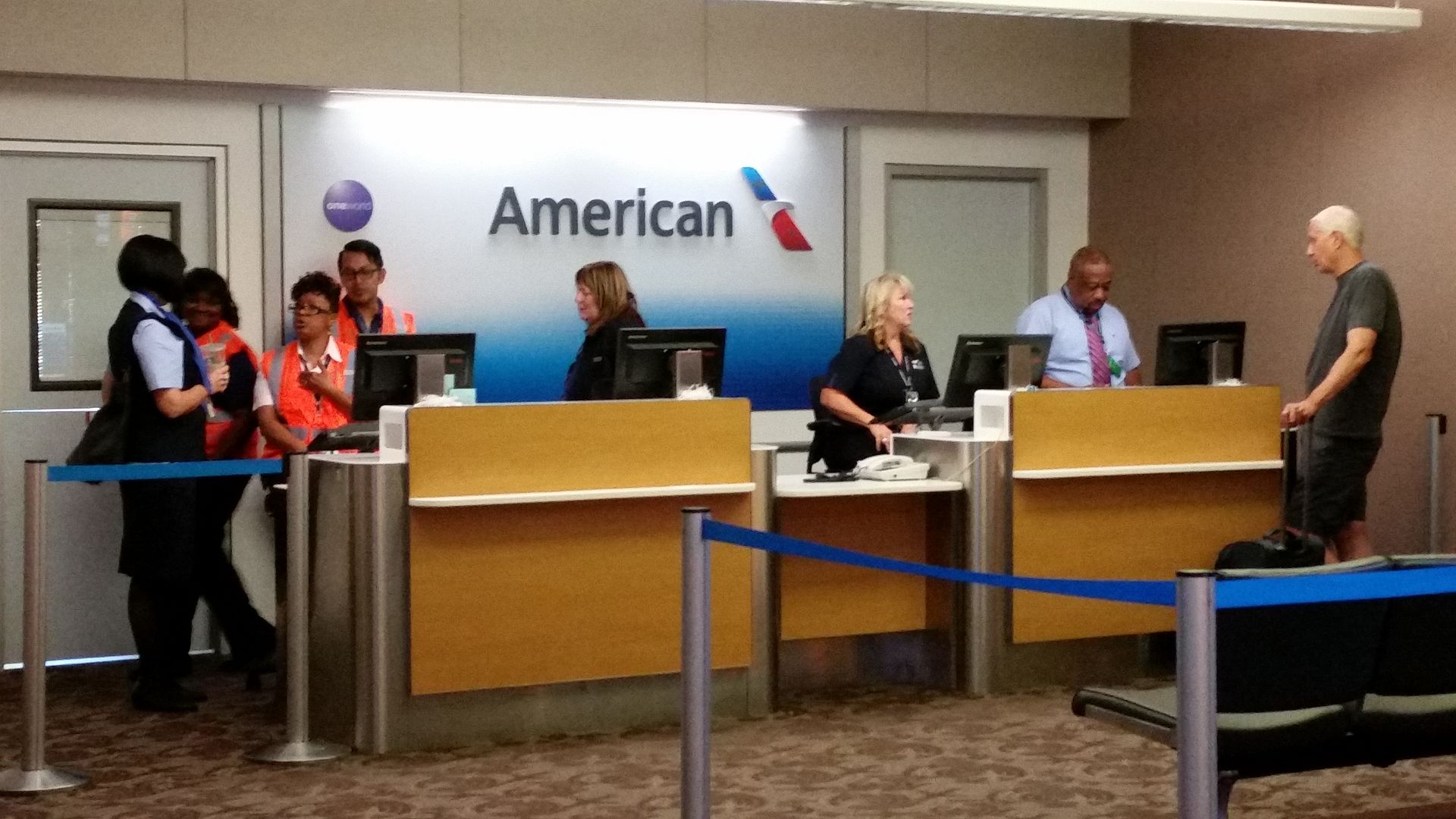The U.S. Court of Appeals for the Ninth Circuit issued a ruling today that a customer who paid US Airways $15 for a checked bag could sue the airline (and potentially certify a class action) for return of their $15 because their bag wasn’t delivered the same day. This case is now being argued by American Airlines, since US Airways and American merged three and a half years ago.
If an airline is going to promise timely delivery of a bag, and fails to do so, a customer can sue.

American Airlines Phoenix
This seems fairly straightforward, but the 1978 Airline Deregulation Act and subsequent Supreme Court decisions interpreting it make it very difficult for customers to sue airlines. The federal government pre-empts state regulation of airlines, leaving that task to the Department of Transportation so that there’s one national regulatory structure. And the Supreme Court has held that state level claims like a covenant of good faith and fair dealing can not be imposed on a contract, that’s like a state regulating an airline.
Basically you can only sue an airline for violating its own explicit promises (and as in the case of frequent flyer programs if they promise you nothing you’re basically stuck, doubly so since your only recourse then is the Department of Transportation which itself found that it improperly ignores complaints about loyalty programs).
When Hayley Hickcox-Huffman bought a ticket to fly from Colorado Springs to San Luis Obispo, US Airways charged $15 for the first checked bag and $25 for the second. She checked one bag. The bag didn’t arrive with her flight, and it wasn’t returned until the next day.
Her argument is that she paid for a service – timely delivery of a bag – and she didn’t receive that service and so she shouldn’t be charged for the service. The economics of the lawsuit only work here of course if this case becomes a class action — not if it’s really just over $15.
The Court had to determine whether US Airways’ own rules promised “to deliver the bag when she landed, rather than the next day” because we can only sue over what an airline directly commits to. They concluded that US Airways offered timely delivery of her bag (upon landing) in exchange for a baggage fee, and that anything other than timely delivery was treated as a delay in the US Airways terms.
In its terms of transportation, the airline says “US Airways has committed to . . . [p]rovide on-time baggage delivery.” Unlike the “best efforts” language for finding and delivering delayed baggage, the commitment has no “every effort” or other language limiting the commitment in some way that might arguably make it a mere promise of best efforts or mere aspirations. US Airways assented to be bound to deliver checked baggage on a passenger’s arrival. It is hard to see what “committed” might mean other than a promise, a contractual obligation.

The airline argued among other things that:
- That their $3300 cap on damages should preclude the claim, but the plaintiff was only seeking $15.
- They don’t promise a refund, so failing to provide a refund isn’t a breach of contract and the customer cannot sue. The Court said a contract without explicit remedies for breach is not the same as a contract that allows breach and no remedy.
This is a good decision for consumers, we can still sue when an airline makes a promise and fails to deliver. It’s a very limited decision, if the terms and conditions had promised less (such as that they would try to deliver bags on time but not promise to do so) there wouldn’t be a claim.
US airlines can’t be made to follow rules not explicitly set by the Department of Transportation. The law can’t impose promises on them. But once they make a promise, the 9th circuit ruled that the Airline Deregulation Act doesn’t prevent them from being held to that promise.
No state law made US Airways promise timely delivery of the first bag for $15. The airline could have made any of the promises hypothesized above or none of them. Enforcing its voluntarily undertaken contractual obligation comports with the purpose of the Airline Deregulation Act, which “simply holds parties to their agreements—in this instance, to business judgments an airline made public about its rates and services.”
We may just continue to get fewer and fewer promises from airlines, like American AAdvantage specifically changing its terms to say they “disclaim any duty of good faith and fair dealing” with their customers.
It took nearly five years for this case to be decided by the Court. It was held up by several other cases, waiting to see how those (such as Northwest v Ginsberg) would impact the legal analysis. Now the plaintiff should get to argue to certify their class action and potentially argue their case on the merits. Although this is far from over.
Ultimately I read this as a Full Employment Act for Lawyers to continually review airline communications to ensure no actual enforceable promises are made. But that seems to be the state of the law.
Here’s the singer from Puddle of Mudd riding the baggage carousel in Denver.
(HT: Eric F.)


This is textbook contract law. You pay someone to provide a service. They fail to timely perform the service. You are entitled to damages. IMO the defense is so frivolous here that both AA and its lawyers should be sanctioned. But that’s another motion for another day.
Note that AA could have avoided the entire lawsuit by including free checked bags, as WN does. Excessive greed did them in.
I think they also could have avoided the lawsuit by just giving back the $15, which really seems like the least they could have done. Sad that this had to get all the way to a ruling.
How does AA/USAir lose this case? After about 5 minutes of legal discussion they should have just refunded the $15. Just having the case heard where the route of appeal is in the 9th Circuit is enough of a gamble.
On the other hand, how does this plaintiff’s law firm expect the verdict to be upheld? Denver is famous for their baggage handling “system”. Is that a system owned and operated by the airport? Who gives the refund? The Airport or the airline? What if TSA ruffles through the luggage and notices something irregular requiring additional time? What if there is too much luggage for the TSA to sort through and it takes them longer? I don’t see the verdict being upheld. The fact that state law does not govern doesn’t give the plaintiff more rights.
What always appals me about the American legal system is that it is possible to enforce a contract that allows breach and no remedy. That is one hell of a distortion in an industry where the parties of the contract often are a multi-billion dollar company and one individual, who can be the mailman or the primary teacher that makes 36k a year.
The important thing here is that the America West clowns who thought it would be a better decision to NOT automatically refund $15 are now in charge of American Airlines.
Oops. American rolled the dice looking for a decision saying the consumer can’t sue, and it comes up snake eyes. Their Legal Staff senior people (curiously, I found no one listed as General Counsel, although there was a Deputy GC and several Associate GC’s) wear this one for some bad judgment.